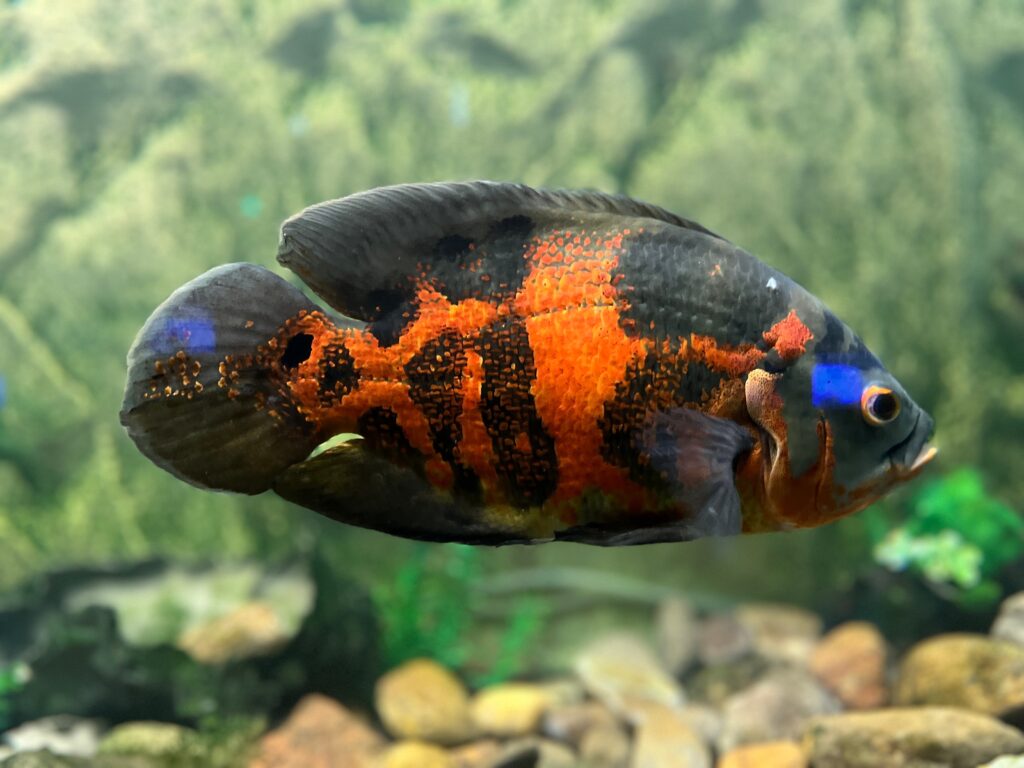Tiger Oscars: Complete information and guide

Appearance and Behavior
Tiger Oscars have a rounded, laterally compressed body with prominent eyes and large mouths. Their coloration is often a mix of dark and bright patterns, resembling a tiger’s stripes, hence the name. These fish are known for their intelligence and can even recognize their owners, often interacting with them through the glass.
They are also territorial and can be aggressive, especially during breeding. Oscars are social fish, but they should be housed with other large, robust species to avoid bullying smaller tank mates.
Tank Requirements
Given their size and activity level, Tiger Oscars require a spacious tank. Here are the key tank requirements:
- Tank Size: A minimum of 75 gallons (284 liters) is recommended for a single Oscar, but larger tanks (100+ gallons) are better, especially if you plan to keep multiple Oscars or other large fish.
- Water Conditions: Maintain a temperature between 74-81°F (23-27°C) with a pH level between 6.5 and 7.5. They prefer slightly soft to moderately hard water.
- Filtration: Oscars are messy eaters, so a strong filtration system is essential to keep the water clean and well-oxygenated. Regular water changes (25-30% weekly) are necessary.
- Substrate and Decor: A sandy or fine gravel substrate is ideal. They like to dig and rearrange the tank, so secure any decorations or plants. Use hardy plants or opt for artificial ones, as Oscars may uproot live plants.
- Hiding Spots: Include caves, rocks, and driftwood to provide hiding spots, which can help reduce stress.
Diet
Tiger Oscars are omnivorous with a strong preference for a protein-rich diet. In the wild, they eat insects, smaller fish, and various invertebrates. In captivity, their diet should include:
- Pellets: High-quality cichlid pellets should form the staple of their diet.
- Frozen/Live Food: Offer bloodworms, brine shrimp, krill, and earthworms. They also enjoy live feeder fish, but this should be done sparingly to avoid introducing diseases.
- Vegetables: Occasionally, you can feed them blanched vegetables like peas or spinach to ensure a balanced diet.
Health and Lifespan
Tiger Oscars can live for 10-15 years or more with proper care. However, they are susceptible to common freshwater fish diseases, such as ich, fin rot, and hole-in-the-head disease. To keep them healthy:
- Maintain good water quality with regular testing.
- Provide a varied diet to prevent nutritional deficiencies.
- Quarantine new fish before introducing them to the main tank to prevent disease outbreaks.
Social Behavior
Tiger Oscars can be kept with other large, robust fish, such as other cichlids, catfish, or large plecos. However, they should not be kept with small or timid species, as they may bully or eat them. If kept with other Oscars, ensure the tank is large enough to accommodate their territorial nature.
Breeding
Breeding Oscars in captivity is possible but challenging due to their territorial aggression. They form monogamous pairs, and breeding usually occurs after a period of courtship. The female will lay hundreds of eggs on a flat surface, which both parents will guard aggressively. The eggs hatch in about 3-4 days, and the fry become free-swimming a week later. It’s essential to provide a separate breeding tank to ensure the safety of the fry and the parents.
Tiger Oscars are a rewarding species to keep for experienced aquarists. With proper care, they can be a long-lived and engaging addition to a freshwater aquarium.


